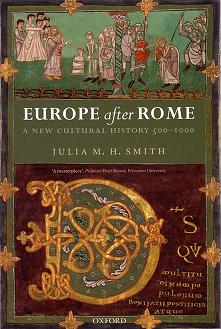
Europe after Rome
Julia M. H. Smith
384 pages including index
published in 2005
To be honest I only took this book out of the library because there was little else in the way of good history books that day. Europe after Rome was a bit of a safe choice, on a subject I’d already read a lot about and if perhaps it would offer little new knowledge, I knew I would at least enjoy the refresher. I had no high hopes for this book, but sometimes gambles pay off — this was one of these cases. Because Europe after Rome is, as the subtitle makes clear, A New Cultural History of the period between 500 and 1000 CE, between the “fall” of the Roman Empire and the start of the “true” Middle Ages.
Traditionally historians have treated this period as a transitional one between this two high points of civilisation, as a story of collapse and rebound, when the seeds were laid for what would become the familiar nations of modern Europe: France, Germany, England. Europe after Rome abandons this teleological view deliberately in favour of an approach that follows three interpretative threads: the role of the Roman heritage in the formation of Early Medieval cultures/policies, the diversity of experience for these cultures — this is not a book about European culture, but about the cultures of Europe — and finally, the dynamism of these cultures, all changing a lot over this period, which Smith is careful never to imply as meaning that these were evolving towards a set goal. To help her with this approach, she takes care to look at a wide range of European experiences, both geographically by looking at a region that reaches from Spain to Scandinavia and from Italy to Hungary and by crosscutting between cultures within each chapter for her examples.
Steve
November 18, 2011 at 6:35 amSounds like a good antidote to the only work of general European history I’ve read on that period – HAL Fisher’s one from the 1930s – very “onwards and upwards” Whig interpretation, iirc.
I really must read more history….